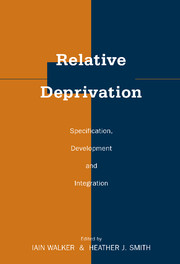Book contents
- Frontmatter
- Contents
- List of Contributors
- 1 Fifty Years of Relative Deprivation Research
- PART ONE SPECIFICATION
- PART TWO DEVELOPMENT
- PART THREE INTEGRATION
- 11 Social Identity and Relative Deprivation
- 12 Relative Deprivation and Counterfactual Thinking
- 13 Relative Deprivation and Attribution: From Grievance to Action
- 14 Spontaneous Temporal and Social Comparisons in Children's Conflict Narratives
- 15 Prejudice as Intergroup Emotion: Integrating Relative Deprivation and Social Comparison Explanations of Prejudice
- Part Four Conclusion
- Index
14 - Spontaneous Temporal and Social Comparisons in Children's Conflict Narratives
Published online by Cambridge University Press: 29 September 2009
- Frontmatter
- Contents
- List of Contributors
- 1 Fifty Years of Relative Deprivation Research
- PART ONE SPECIFICATION
- PART TWO DEVELOPMENT
- PART THREE INTEGRATION
- 11 Social Identity and Relative Deprivation
- 12 Relative Deprivation and Counterfactual Thinking
- 13 Relative Deprivation and Attribution: From Grievance to Action
- 14 Spontaneous Temporal and Social Comparisons in Children's Conflict Narratives
- 15 Prejudice as Intergroup Emotion: Integrating Relative Deprivation and Social Comparison Explanations of Prejudice
- Part Four Conclusion
- Index
Summary
Theories of relative deprivation present an intriguing contradiction. On the one hand, their basic tenets (e.g., Crosby, 1976) are little more than common sense. Few people would be astonished to learn, for example, that individuals compare their own outcomes to those of others. Or that individuals feel deprived when they discover that someone else possesses an object that they crave and feel entitled to own. On the other hand, the concept of relative deprivation can help explain some quite surprising research findings. Researchers have reported that impoverished, elderly African American widows living in objectively deplorable conditions are highly satisfied with their lives, with an average rating above 9 on a 10-point satisfaction scale (Cairns & Cairns, 1994, pp. 148–150). Also, visually impaired and physically handicapped individuals are about as satisfied with their lives as nonhandicapped individuals (Cameron, Titus, Kostin, & Kostin, 1973). These findings can be explained in terms of the differing frames of reference people adopt to evaluate their lives. The data illustrate the importance of viewing deprivation as relative rather than absolute.
Deprivation may be relative, but to what standards do people compare their own outcomes? Several theorists have emphasized the distinction between personal (or egoistic) and group (or fraternalistic) relative deprivation (Pettigrew, 1967, 1978; Runciman, 1966; Walker & Pettigrew, 1984). Group relative deprivation results from comparing an ingroup's position (a group to which one belongs) to that of a better-off outgroup.
- Type
- Chapter
- Information
- Relative DeprivationSpecification, Development, and Integration, pp. 313 - 331Publisher: Cambridge University PressPrint publication year: 2001
- 1
- Cited by



